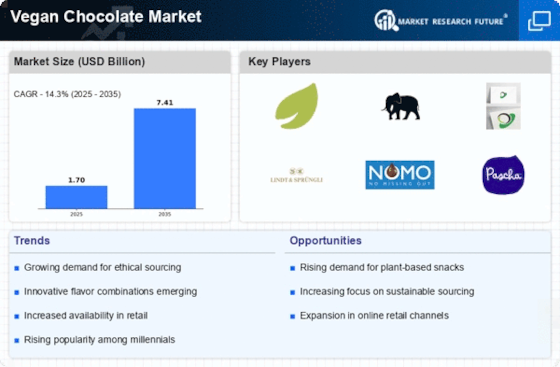Top Industry Leaders in the Vegan Chocolate Market
 The competitive landscape of the vegan chocolate market is characterized by key players implementing various strategies to capitalize on the growing demand for plant-based and ethically sourced confectionery. These players significantly influence industry dynamics, and their strategies collectively shape the overall competitive scenario.
The competitive landscape of the vegan chocolate market is characterized by key players implementing various strategies to capitalize on the growing demand for plant-based and ethically sourced confectionery. These players significantly influence industry dynamics, and their strategies collectively shape the overall competitive scenario.
Key Players:
Chocoladefabriken Lindt & Sprüngli AG
Montezuma’s Direct Ltd.
Alter Eco
Endorfin Foods
taza chocolate
Nestlé S.A.
Barry Callebaut
Evolved Chocolate
Mondelēz International
Endangered Species Chocolate, LLC.
Strategies Adopted:
The vegan chocolate market adopt various strategies to address the increasing consumer interest in plant-based and ethically produced sweets. A common approach involves continuous product innovation, with companies introducing new flavors, unique formulations, and diverse product lines that cater to various dietary preferences. Additionally, strategic partnerships with retailers, expansion of distribution networks, and effective marketing campaigns contribute to expanding market reach and ensuring that vegan chocolates are accessible to a broader consumer base.
Efficient supply chain management, transparency in sourcing practices, and investments in research and development are critical elements of the strategies adopted by key players. These strategies enable companies to offer premium-quality, ethically produced products while maintaining competitive pricing, ensuring consumer satisfaction within the growing vegan and plant-based market.
Market Share Analysis:
The vegan chocolate industry is influenced by several factors. Brand loyalty, product taste and quality, pricing, and ethical sourcing play pivotal roles in consumers' purchasing decisions. Companies that invest in understanding and addressing specific consumer needs, including concerns about animal welfare, sustainability, and health-conscious preferences, gain a competitive edge. Furthermore, effective marketing, strong distribution channels, and responsive customer service contribute significantly to brand loyalty and market share.
News & Emerging Companies:
The vegan chocolate market has witnessed the emergence of new and specialized companies responding to the demand for innovative and high-quality plant-based chocolates. Emerging players, such as Raaka Chocolate and Endangered Species Chocolate, have entered the market with a focus on direct trade and transparent sourcing, contributing to the diversification of available products and enhancing overall market competitiveness.
Industry Trends:
The vegan chocolate industry include a growing emphasis on ethical sourcing, sustainable packaging, and product transparency. Companies are investing in research and development to introduce chocolates with fair trade and direct trade certifications, environmentally friendly packaging materials, and clear labeling that communicates the ethical and sustainable aspects of their products. Additionally, there is a noticeable trend of companies enhancing their online presence, optimizing e-commerce platforms, and utilizing digital marketing for targeted advertising. This move not only addresses the evolving needs of conscious consumers but also positions these companies strategically in the competitive online market.
Furthermore, the industry has witnessed increased investments in sustainability and ethical sourcing initiatives. Companies are prioritizing partnerships with cacao farmers, implementing traceability measures, and adopting practices that ensure fair compensation for growers. This move not only aligns with the values of ethically conscious consumers but also positions these companies as leaders in responsible and sustainable practices within the vegan chocolate market.
Competitive Scenario:
The vegan chocolate market is marked by intense competition among key players, driven by the increasing demand for ethically sourced, plant-based sweets. Companies are engaged in a continuous race to offer not only high-quality and delicious products but also solutions that align with broader trends of sustainability, transparency, and health-conscious choices.
The market is also influenced by factors such as the growing awareness of ethical consumerism, the impact of social media in shaping brand perception, and the ongoing global movement toward plant-based diets. Manufacturers must adapt swiftly to market demands, ensuring that their vegan chocolates not only meet the highest ethical and quality standards but also address the evolving concerns of consumers seeking delicious and socially responsible confectionery.
Recent Development
The vegan chocolate market witnessed a notable development with key players focusing on advanced sustainability practices and flavor innovation. Several major companies announced significant investments in partnerships with cacao cooperatives, introducing chocolates with traceable and ethically sourced ingredients. These innovations were aimed at meeting the demands of conscious consumers seeking assurances of fair and sustainable practices throughout the supply chain.
Moreover, there was a discernible trend of companies intensifying flavor innovation efforts. Major players announced initiatives to expand their product lines with unique and exotic flavor profiles, catering to the discerning tastes of consumers seeking diverse and indulgent vegan chocolate options. This move not only addressed the demand for premium and innovative offerings but also positioned these companies at the forefront of flavor trends in the competitive vegan chocolate market.











